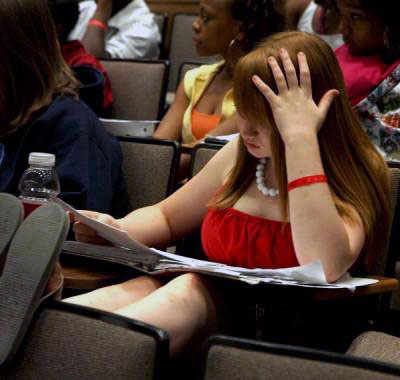All Nonfiction
- Bullying
- Books
- Academic
- Author Interviews
- Celebrity interviews
- College Articles
- College Essays
- Educator of the Year
- Heroes
- Interviews
- Memoir
- Personal Experience
- Sports
- Travel & Culture
All Opinions
- Bullying
- Current Events / Politics
- Discrimination
- Drugs / Alcohol / Smoking
- Entertainment / Celebrities
- Environment
- Love / Relationships
- Movies / Music / TV
- Pop Culture / Trends
- School / College
- Social Issues / Civics
- Spirituality / Religion
- Sports / Hobbies
All Hot Topics
- Bullying
- Community Service
- Environment
- Health
- Letters to the Editor
- Pride & Prejudice
- What Matters
- Back
Summer Guide
- Program Links
- Program Reviews
- Back
College Guide
- College Links
- College Reviews
- College Essays
- College Articles
- Back
University of Maryland college essays (short)
Essay 1 prompt: Other than fashion, what medium do you use for self-expression and why?
It may seem a bit counterintuitive, but my means of self-expression is becoming someone else. As an actor, my ultimate goal is to engulf my audience in a story by adopting an identity outside myself, and adopting it with conviction. I aspire to make my performances experiences, not just shows.
Sometimes it is difficult to explain to people who do not act how acting can be a means of self-expression. It is strange to think that you can express yourself by trying to become someone else. What I have learned from every role I have acted, large or small, is that each character becomes a new lens through which I see myself. I learn about my own identity by realizing which traits are easy to act out and which are more difficult. I have always considered myself a loud person, self-assured and secure. But I found it incredibly difficult to play the Wicked Witch of the West in The Wiz, even though the character shared those traits. In playing that role, I was able to learn more about myself by realizing what I was not. I began to see myself as a girl with insecurities and weaknesses just like everyone else, and yet a girl endowed with the power to overcome them. When I played the role on stage, I was able to express this self-discovery by teaching myself to become a character who I realized was very different from myself. You will often hear the idea of actors “getting lost in their roles,” but in reality, every actor brings individuality to every role; no two actors will play the same character in the same way. Acting is a catalyst for my individuality and self-discovery, and I hope to continue to find myself in every role.
Essay prompt 2 (create your own question) - Describe an era of history that you’ve learned about and its impact on you.
Last year in American Civilizations, we studied the 1960’s. I fell in love with the hippie movement, in all its color and beauty. To me, fighting for something like the hippies fought for peace and equality seemed to embody a life with grater purpose. When I told my mom how I felt, she tried to show me reality, how living in such turmoil was often dangerous, frustrating and scary. I told her that I understood, but explained to her my frustrations about being such a passionate person and feeling like I had nothing to fight for. “I was born in the wrong time,” I told her, “I want to feel passion for my generation, but I don’t. I want a rebellion, but there’s nothing to rebel against.” A long time before I was in high school, one senior class organized a school “sit- in” to protest how school rules were enforced. A bunch of friends and I agreed that our senior class would try to have a sit-in ourselves; we just had to wait for a reason. After a while, we got our wish: a student was punished and later ended up leaving our school for reasons we considered unjust. But we knew we couldn’t organize a sit in. It would have felt like taking advantage of someone else’s tragedy. I realized then that rebellion is not something you can force or make happen, and you can’t be passionate about being passionate; you have to find something that inspires you to work and fight for a way to be a catalyst for change. I still love learning about the sixties, but I am confident now in my ability to make a change in my own world.

Similar Articles
JOIN THE DISCUSSION
This article has 0 comments.
